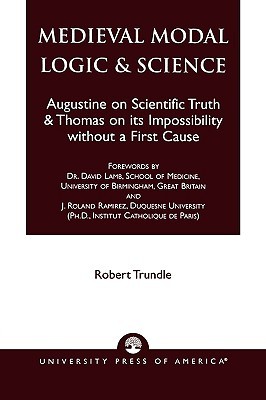
- We will send in 10–14 business days.
- Author: Robert C Trundle
- Publisher: University Press of America
- ISBN-10: 0761813985
- ISBN-13: 9780761813989
- Format: 15.2 x 22.9 x 1.2 cm, minkšti viršeliai
- Language: English
- SAVE -10% with code: EXTRA
Reviews
Description
Medieval Modal Logic & Science uses modal reasoning in a new way to fortify the relationships between science, ethics, and politics. Robert C. Trundle accomplishes this by analyzing the role of modal logic in the work of St. Augustine and St. Thomas Aquinas, then applying these themes to contemporary issues. He incorporates Augustine's ideas involving thought and consciousness, and Aquinas's reasoning to a First Cause. The author also deals with Augustine's ties to Aristotelian modalities of thought regarding science and logic, reassessing the commonly held belief in Augustine's Platonism to not be a mistake as much as a simplistic view of his philosophy. Trundle links contemporary issues in epistemology, morality, theology, and logic, making several useful connections between ancient and medieval studies in modal logic and modern concerns. These applications of modal theory illuminate many puzzles in the works of Heidegger, Wittgenstein, Whitehead, and Kuhn.
EXTRA 10 % discount with code: EXTRA
The promotion ends in 21d.08:20:01
The discount code is valid when purchasing from 10 €. Discounts do not stack.
- Author: Robert C Trundle
- Publisher: University Press of America
- ISBN-10: 0761813985
- ISBN-13: 9780761813989
- Format: 15.2 x 22.9 x 1.2 cm, minkšti viršeliai
- Language: English English
Medieval Modal Logic & Science uses modal reasoning in a new way to fortify the relationships between science, ethics, and politics. Robert C. Trundle accomplishes this by analyzing the role of modal logic in the work of St. Augustine and St. Thomas Aquinas, then applying these themes to contemporary issues. He incorporates Augustine's ideas involving thought and consciousness, and Aquinas's reasoning to a First Cause. The author also deals with Augustine's ties to Aristotelian modalities of thought regarding science and logic, reassessing the commonly held belief in Augustine's Platonism to not be a mistake as much as a simplistic view of his philosophy. Trundle links contemporary issues in epistemology, morality, theology, and logic, making several useful connections between ancient and medieval studies in modal logic and modern concerns. These applications of modal theory illuminate many puzzles in the works of Heidegger, Wittgenstein, Whitehead, and Kuhn.


Reviews